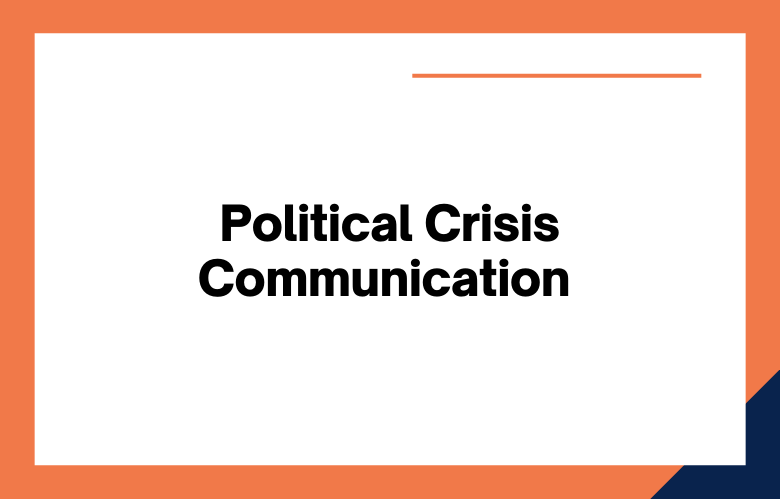A political crisis can be a terrifying thing for any campaign. And while having a plan in place is essential, sometimes you’re forced into action before you’ve had time to prepare. We’ll look at the key things that need to be done when handling a crisis from start to finish and how best to react when faced with an unforeseen situation.
Do you know how to handle political crisis communication in your election campaign? Here are five tips that will help.
- Be transparent and honest about the crisis,
- Acknowledge the problem,
- Take responsibility for it,
- Explain what you’re doing to remedy it,
- Provide an update on progress.
What is Political Crisis Communication?
A political crisis is when the people in charge of your country try to tell you what’s wrong with it.
Political crises are challenging for politicians, parties, and governments to handle.
Political Crisis Communication refers to communication strategies used by political leaders and their teams.
Political crisis communication is a way for politicians and government agencies to communicate with the public during crises.
Public officials use political crisis communication to manage their messages and messages about those in political distress. These messages can handle several forms: speeches, interviews, press releases, and other statements and documents.
Organizations must ensure their messaging is clear and consistent in a political crisis.
How to Handle Political Crisis Communication in Your Election Campaign
- Establish a Crisis Communication Team
- Develop an Emergency Response Plan
- Conduct Regular Audits of Media Coverage
- Monitor the News for Potential Issues
- Keep Your Candidate Informed and Up-to-Date with Current Events
- Prepare for Social Media Outbursts
- Consider the timing of your release carefully
- Be transparent and honest about what you know
- Stay away from speculation and rumors
- Don’t make any statements that could be misinterpreted as offensive or inflammatory.
- Avoid using jargon or acronyms to speak to a broader audience (e.g., “NATO”)
- Remember, there is no one-size-fits-all approach – always tailor your message to the situation.
- Develop a crisis communication plan that includes how to respond in an emergency.
- Create a document with talking points and strategies for dealing with negative media coverage.
- Maintain open lines of communication between your campaign team members so they can brainstorm together.
- Monitor public sentiment about your campaign by staying active on social media platforms like Facebook, Twitter, and Instagram.
- Use email marketing campaigns to reach out to potential voters who might be interested in what you have to offer
- Monitor online polls for feedback from voters about which issues are most important or exciting to them.
- Make sure you have a crisis communication plan in place
- Have an emergency team ready to act at any time
- Be transparent when it comes to explaining how you will handle the situation.
- Create a clear message that is easy for people to understand and remember so they can share it with others.
- Develop a crisis communication plan
- Create an emergency response team to handle the situation
- Ensure your campaign is in touch with government officials and other authorities on the ground, as well as local media outlets
- Be prepared for misinformation by monitoring social media channels like Twitter and Facebook
- Prepare for potential violence – create a safety plan that includes evacuation routes, security detail, etc., if necessary
- Make sure you know what resources are available to you at all times (local law enforcement agencies, hospitals)
- Respond quickly with a detailed explanation of how you will address their concerns
- Be transparent by answering any questions from reporters or voters, even if you don’t like the question
- Stay calm in challenging situations
- Choose a spokesperson knowledgeable about the crisis and has good public speaking skills.
- Be prepared to answer questions from the media with facts, not speculation
- Stay on message- don’t get sidetracked by other issues or let your spokespeople go off-script
- Check-in with your campaign team every day for updates and have a plan of action ready if things change quickly
- Be prepared for anything
- Be upfront and honest with the voters about what is happening
- Keep your cool in front of the cameras, even if you are angry inside
- Listen to both sides before making any decisions on how to respond to a crisis
- Remain calm and collected
- Don’t make statements that will give your opponent ammunition to use against you.
- Be honest with the public about what is happening in the government, but don’t share sensitive information.
- Put a statement on social media explaining your position on the crisis so voters know where you stand.
- Be aware of the risks and threats to your campaign
- Keep a positive attitude, even if things are not going well
- Take responsibility for what you did wrong
- Know when it’s time to apologize or make amends with people you have offended.
- Ensure your staff is on board with the plan before implementing any changes.
- Act quickly and decisively
- Be transparent about the situation at hand
- Give information to the public, but not too much or too little
- Stay calm under pressure
- Understand the crisis and its implications
- Assess your campaign’s strengths and weaknesses
- Create a strategy for managing the crisis that is best for you, your team, and your supporters.
- Communicate with staff members on how to react in public
- Be honest about what happened when answering questions from reporters or other media outlets
- Identify what your organization’s goals are and make sure they align with the campaign’s objectives
- Make sure you have access to all relevant information about the event that caused the crisis, including facts and figures, timelines, and any other pertinent details
- Develop an internal response team by assigning roles: spokespersons, media liaisons, social media managers, public affairs officers (if available), lawyers (if needed)
- Determine who will be communicating externally: spokespersons or designated surrogates. Media outlets? Social media channels? Bloggers? Election website updates? Press releases? External blogs/news sites for commentary on events surrounding the crisis
- Be aware of the situation and know how to respond
- Keep your message consistent and on-message
- Don’t overreact, but don’t underreact either
- Address the problem head-on promptly
- Be honest and give the facts
- Take responsibility for mistakes, but don’t apologize
- Focus on what you can do to fix the problem instead of dwelling on it
- Listen to your supporters and consider their advice when making decisions
- Avoid talking about how other politicians are handling crisis communication in their campaigns.
Conclusion
Crisis communication is an essential part of any election campaign. However, political crises are unique and require careful attention to be handled effectively.
If you want more information on how we can help your next political crisis go smoothly or want some general advice for handling a future crisis, please get in touch with us today!
How to Handle Political Crisis Communication in Your Election Campaign: FAQs
What Is Political Crisis Communication?
Political crisis communication involves managing messaging and public perception during political scandals, controversies, or emergencies.
Why Is Crisis Communication Important For Politicians?
Effective crisis communication helps maintain public trust, minimize reputational damage, and restore credibility during challenging situations.
What Are The Key Components Of A Political Crisis Communication Plan?
Key components include a crisis team, message control, real-time monitoring, stakeholder communication, and post-crisis evaluation.
How Should Politicians Prepare For A Potential Crisis?
They should conduct risk assessments, identify spokespersons, create holding statements, and establish internal communication protocols.
What Role Does A Spokesperson Play In Crisis Management?
A trained spokesperson ensures message consistency, handles press briefings, and communicates the party or leader’s stance professionally.
How Can Political Leaders Control The Narrative During A Crisis?
By responding quickly, taking responsibility where appropriate, using credible data, and framing the issue in a proactive and transparent manner.
What Are Common Mistakes In Political Crisis Communication?
Delays in response, inconsistent messaging, blaming others, avoiding the media, or appearing insincere often worsen the crisis.
How Does Social Media Impact Political Crisis Communication?
Social media accelerates the spread of both accurate and false information, making it essential for political actors to engage in real-time response.
Should Politicians Apologize During A Crisis?
Yes, when appropriate. A sincere apology can rebuild trust and demonstrate accountability, especially when followed by corrective action.
What Is Message Framing In Political Crisis Communication?
It involves presenting the issue using specific language or context that resonates with the audience while steering public perception.
How Can Political Teams Monitor Crisis Escalation Online?
They can use social listening tools to track keywords, hashtags, sentiment shifts, and influential voices driving the conversation.
What Is The Difference Between Proactive And Reactive Communication?
Proactive communication anticipates and prevents crisis fallout, while reactive communication deals with crisis response after it occurs.
Can Transparency During A Crisis Backfire?
Transparency builds credibility but must be strategic—oversharing without context or preparedness can create new controversies.
What Are Holding Statements In Crisis Communication?
These are pre-approved messages issued immediately to acknowledge a crisis while more information is gathered.
How Do Political Campaigns Handle Misinformation During A Crisis?
Campaigns counter misinformation through fact-checking, official clarifications, legal actions, and amplifying accurate narratives.
Why Is Tone Important In Political Crisis Communication?
Tone affects public trust. A calm, empathetic, and confident tone helps reassure stakeholders and avoid panic or hostility.
How Do You Evaluate The Success Of A Crisis Communication Effort?
By assessing public sentiment, media coverage, voter trust recovery, and the ability to resume normal political operations.
What Is Reputation Repair In Politics?
It refers to long-term efforts like public outreach, policy shifts, and controlled media appearances aimed at rebuilding public confidence.
How Do Cultural And Regional Factors Influence Political Crisis Messaging?
Different regions respond differently to authority, emotion, and transparency, so crisis messaging must be tailored to the audience.
Can A Political Crisis Ever Be Turned Into An Opportunity?
Yes, leaders who demonstrate accountability, empathy, and swift action can emerge stronger and more respected after a crisis.
One way to get in touch is by filling out our online form on this site or give us a call at +91 9848321284. Let’s work together today!










